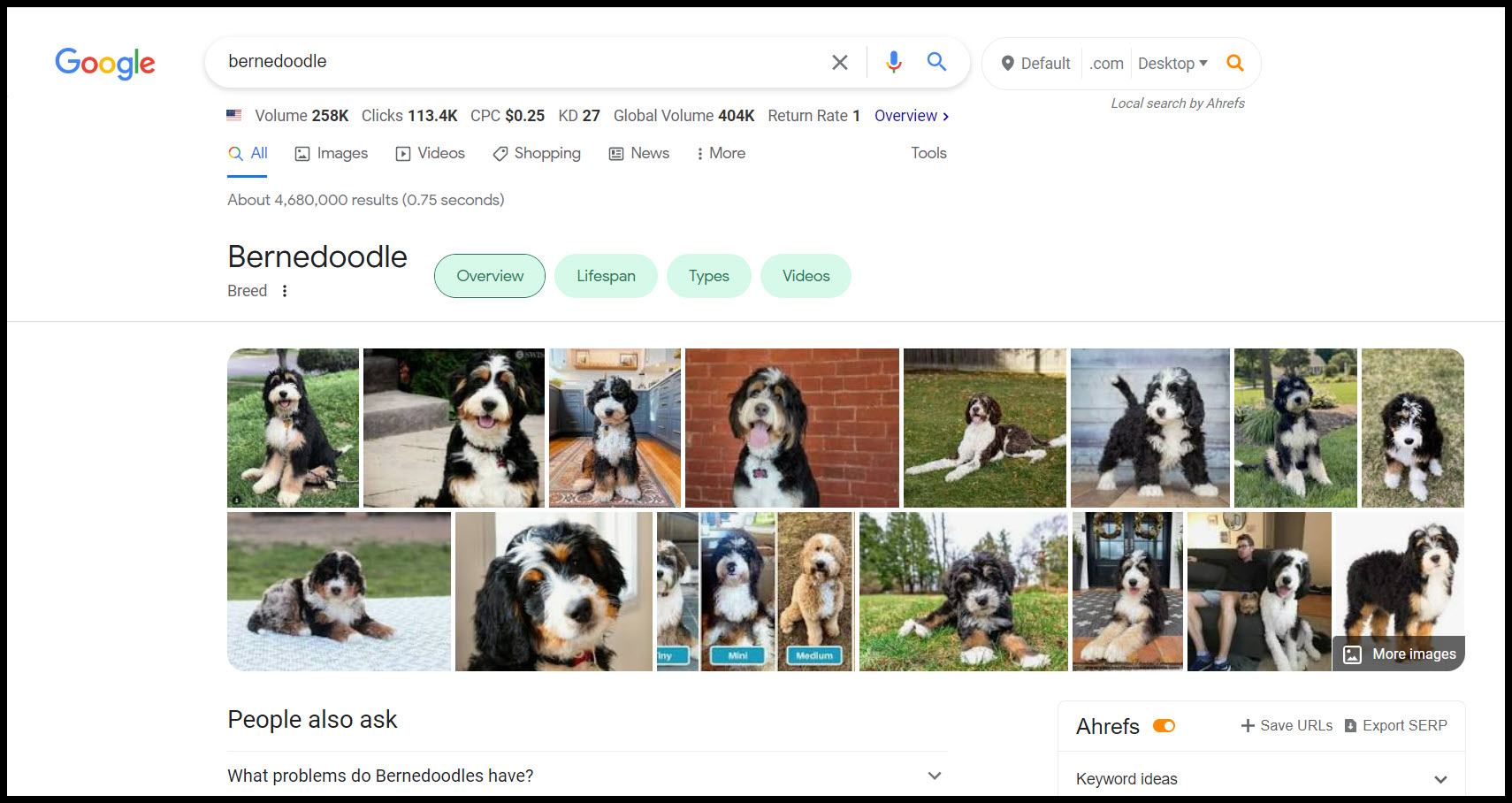As I mentioned in a recent post, it can be hard to determine how difficult a search result is from keyword difficulty scores alone.
As a result, a crucial part of your keyword research process has to be SERP analysis – the process of diving into the SERPs (search engine results pages) to get a sense of your actual chances of ranking for a given term.
The reason this is so key is that keyword research is essentially the process of determining where your resources will be spent.
As much as some people will tell you that “good content wins” if you write 100 amazing articles targeting phrases you’ll never rank for, you’re not going to get any traffic (or, at the very least, you’ll be getting a fraction of the traffic you could have with thorough keyword research).
So in this post we’ll walk you through the process of analyzing search results to determine how competitive they actually are so that you’re not only finding winning topics, but also avoiding spinning your wheels on attractive-looking low KD terms that you’re not actually well-suited to rank for.
It Can Still All Start with Keyword Difficulty
Keyword difficulty doesn’t have to be a bad word. It’s still a very helpful directional metric, it’s just not quite as directly actionable as it once was.
Keyword difficult is a great initial filter for determining the types of terms you’ll want to target.
Let’s start out by saying we have a website dedicated to Bernedoodles (this is near and dear to my heart because I have a pet Bernedoodle named Pinecone – he weighs around 90 pounds and is just as poorly behaved as he is adorable. If you’ve all been very good I may share a picture at the end).
I’m not going to go super in-depth into the keyword research process in this post (I will in a future post!) but we’ll assume we’re starting super basic and just looking for Bernedoodle keywords for our new Bernedoodle site:
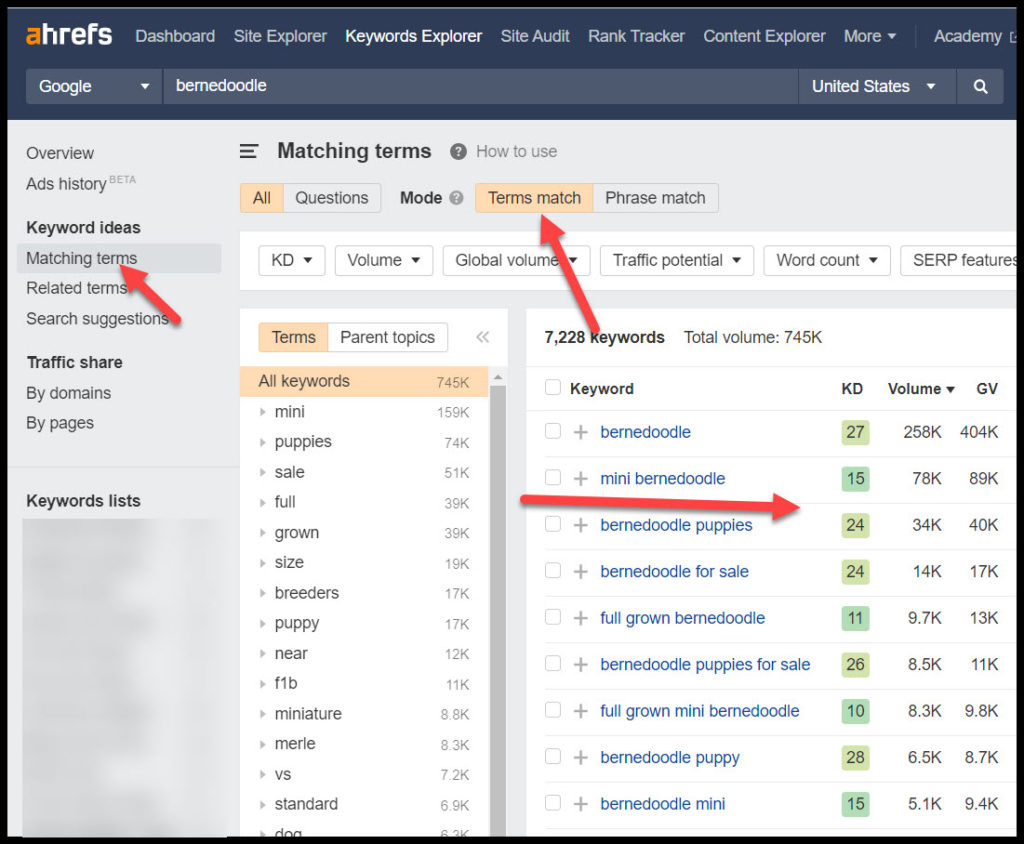
(I’ll use Ahrefs for these examples, but you could work through the same process with SEM Rush or tools with similar metrics.)
What you see above is the output for a query for Bernedoodle, and matching terms (meaning terms that are tightly related to the core term semantically).
This doesn’t look that bad, right?! Lots of green!
SERP Analysis: What to Look For
Well, this is a post on SERP analysis, not looking at random screenshots of Ahrefs (or pictures of Bernedoodles, sadly), so the story doesn’t quite end here.
We’re going to go “Deep SERP Diving” here in just a minute – first I want to call out what we’re looking for in a search result so we know it when we’re out there in the deep blue links (let me know if this analogy starts getting tortured at any point – who am I kidding it definitely won’t, I’ll also 100% stick to it throughout the post):
- How authoritative are the domains currently ranking?
- How closely do ranking pages answer the actual query / question?
- What types of content is ranking?
- What types of sites are ranking?
- How thoroughly and accurately are these sites answering the question?
- How many organic listings are actually likely to be getting traffic (based on other SERP featured in the search result)?
- What kind of topical authority does my site have (and what kind of topical authority do other sites have)?
Each of these questions are important, and they’ll all come up as we dive into analyzing the search results. Let’s get started.
SERP Analysis: Tools of the Trade
Before we dive in and start asking our questions, let’s talk about tools to help you analyze search results. Fortunately, you really don’t need much here, but a Chrome extension that’s giving you some data in real time as you look at search results is very helpful.
I personally use Ahrefs as I find the data is strong, the toolbar gives me exactly the metrics I’m looking for, and frankly I’m old and I’m used to it and not an early adopter anymore.
Keywords Everywhere is also a great option with a super useful free version.
Throughout this post I’ll be analyzing SERPs with Ahrefs turned on, so if you’re seeing some extra data overlayed on the standard search result that’s where it’s coming from.
Now, back to the SERPs!
Is a Term Worth Ranking For? (SERP Features)
The term “Bernedoodle” is a 27 keyword difficulty. You might wonder: if I write the absolute best, most useful, most in-depth article on the Bernedoodle breed ever crafted, can I rank?
First let’s check out the search result on desktop – tons of images in the SERP:
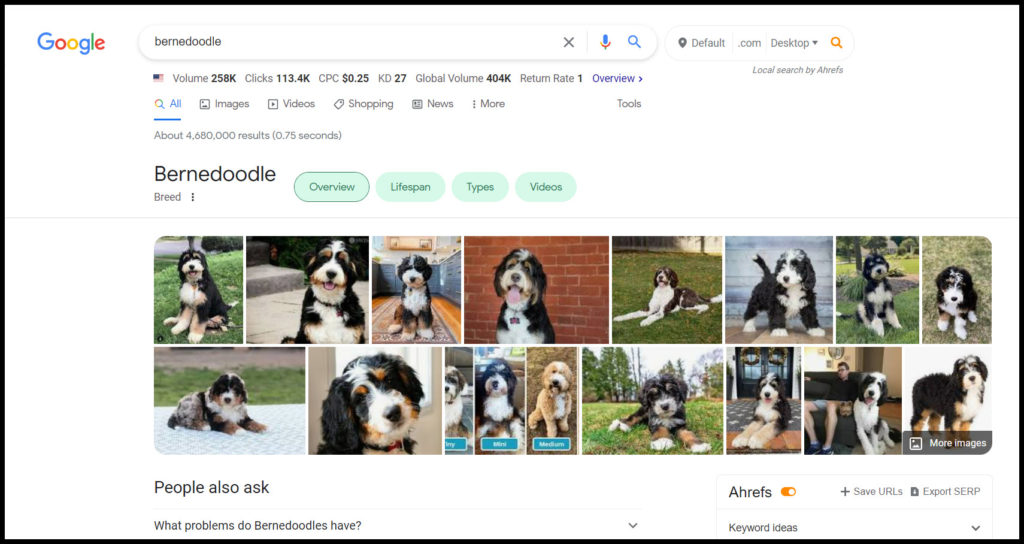
Now let’s quickly check the mobile result (no Ahrefs plugin there):

Looking quickly at the SERP we can see that this is a very visual SERP on desktop, and that there’s at least a chance for a featured snippet on mobile.
Understanding what SERP features are present is a critical piece of SERP analysis. Increasingly you may be wading into a search result that you never stood a chance of driving traffic for because Google is layering in lots of other search features.
That may have been the case if we’d invested heavily in ranking for dog names:
What are we calling these results? MUM? Semantic search? All of the above?
Either way, Google is now aggregating “dog names” from sources around the web in a massive accordion in the top result
Just one of many queries generating this type of SERP feature now. pic.twitter.com/yfZmbKxexK
— Lily Ray 😏 (@lilyraynyc) October 3, 2022
OK so there’s a featured snippet available on mobile for this search at least, let’s look at the rest of the search result, first on desktop:
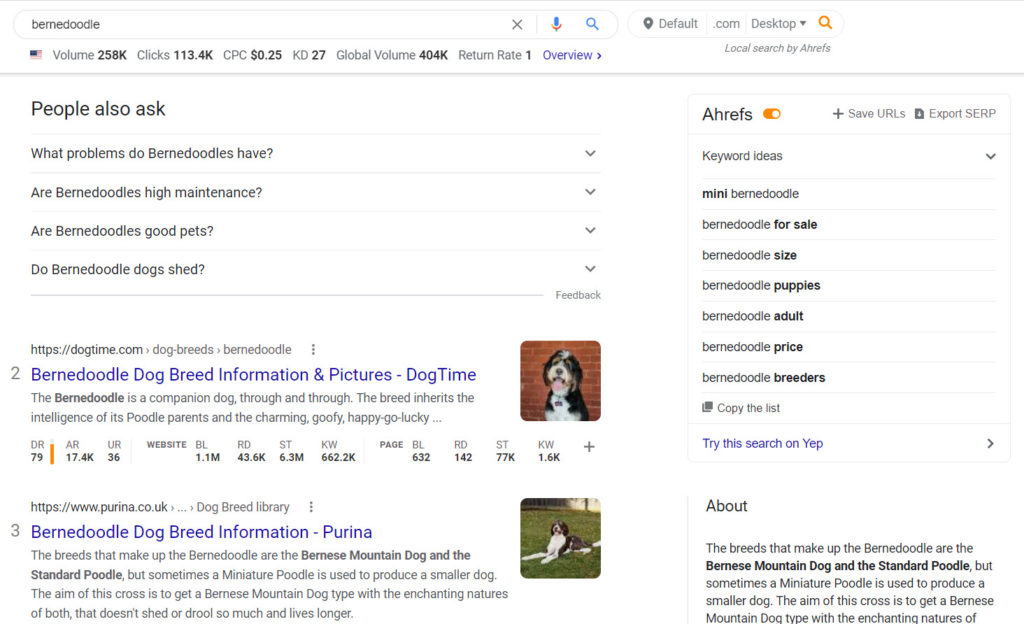
So next there’s a people also ask box and we’re into the results.
As we continue to scroll down we can see some more interesting information:

I live in Massachusetts, so even though I didn’t search for Bernedoodles in MA or Bernedoodle breeders Google is layering in a local result in case that’s the intent of my query (tough to tell with just one word!) then there are video results.
Let’s jump back to the mobile SERP:
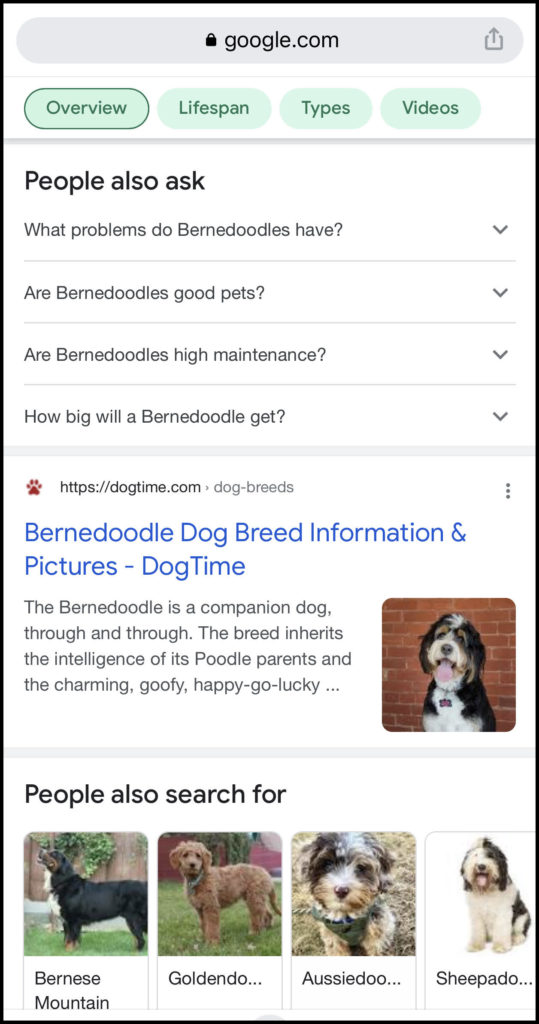
More people also ask, one listing, then people also search for.
From there some more alternative searches, another Bernedoodle listing, and then short videos:

So there’s a fair amount of real estate available on desktop and at least some (albeit limited) on mobile.
What about the authority of the sites ranking?
How Authoritative are the Ranking Sites in Your SERP?
A quick way to gauge the authority of the ranking sites in a SERP is to look at the SERP overview in Ahrefs (look at the overview view for the search then scroll to the bottom):
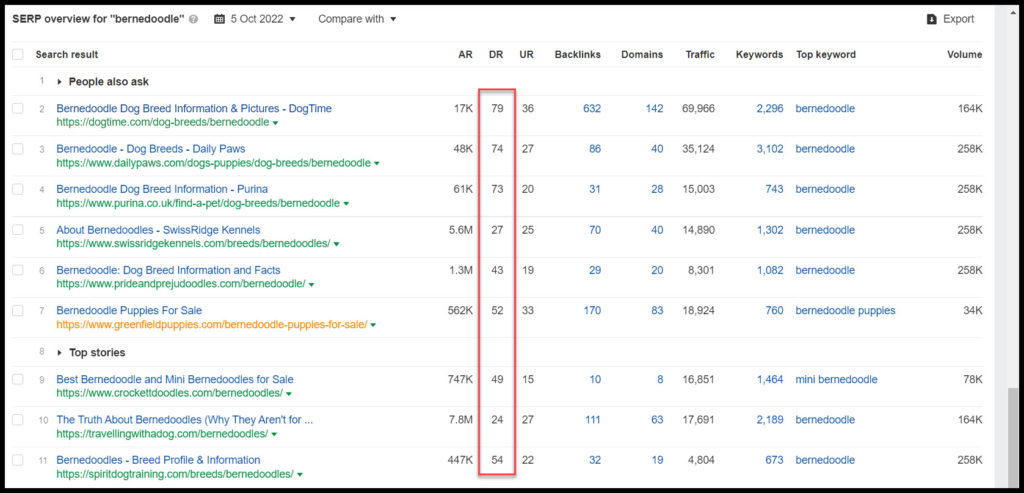
We can quickly see that there are actually some lower DR sites here! Our brand new Bernedoodle site probably still can’t rank, but this is a bit more promising than I’d initially have guessed.
What Kind of Topical Authority Do Sites in the SERP Have?
If I’m writing a lot about Bernedoodles, I’ll have a strong amount of topical authority, but there’s more than one flavor of “topical authority.” Having a lot of info about Bernedoodles is one angle, but if you actually look at the top listings for dog breeds there’s a lot of general dog sites that have the top listing across lots of dog breed pages because Google deems them a trusted site for dog breed related queries:
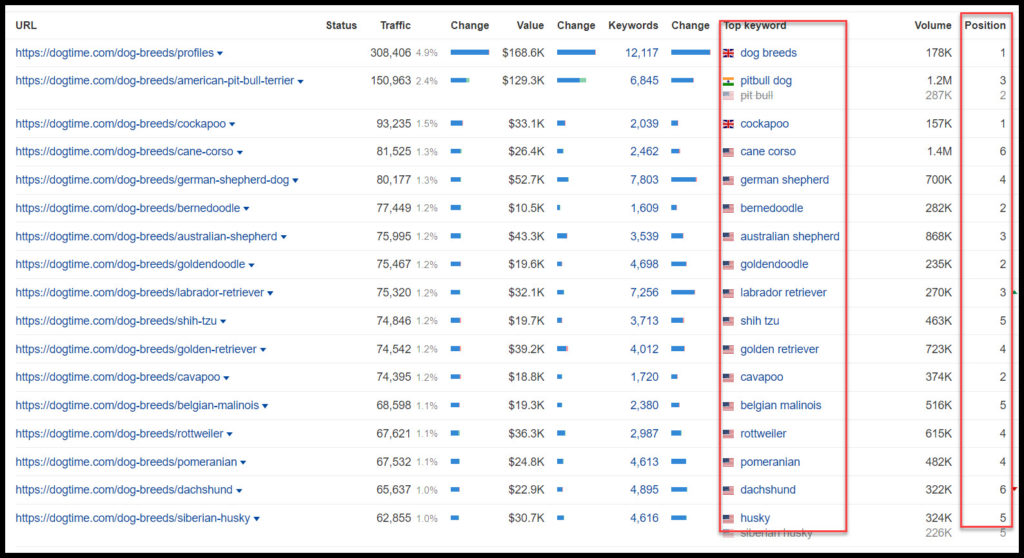
This is an important thing to keep in mind as you analyze SERPs – Google may be looking for a mix of different answers, but also a mix of different sites.
Here’s another example of that – if I search for “Bernedoodle coughing and sneezing” I get the following results:

Here we see two vet sites (authorities on illness) along with a doodle site (breed specific authority).
The best way to understand what Google’s likely to rank for these types of queries is to pay close attention to the authority and the type of sites they’re ranking. If you can find a search result that has:
- Sites similar to yours but of lower authority
- Sites like forums or Quora that Google frequently doesn’t want to rank
That’s likely a good target for you! If we looked at a SERP with our Bernedoodle site and it was all very broad, high authority dog or pet sites as well as veterinary clinic sites (even if these are lower authority than our site), that’s likely a stay-away.
Here’s a great “hack” for finding these types of search results:
We’ve talked about how to establish topical authority by targeting specific content verticals.
But, exactly how do you DISCOVER the LONG TAIL KEYWORDS to fill these content verticals up? 🧐
Here’s my FAVORITE long tail keyword research technique using @semrush.
— Keith (Niche Twins) 👨💻 (@patientpublish) May 19, 2022
And you can also use tools like Low Fruits or Keyword Chef to identify these types of terms as well.
What Kinds of Content Are in the SERPs?
Just like with analyzing the types of domains or sites that are in the SERPs, we also want to get a sense of:
- What kinds of answers is Google looking for (and can we create that content)?
- How closely the results answer the specific query (and can we add something better to the result)?
- How thorough the answers are in the search result?
If we go back to the search result for “Bernedoodle coughing and sneezing” we can see that these results aren’t answering this query with any information specific to Bernedoodles:
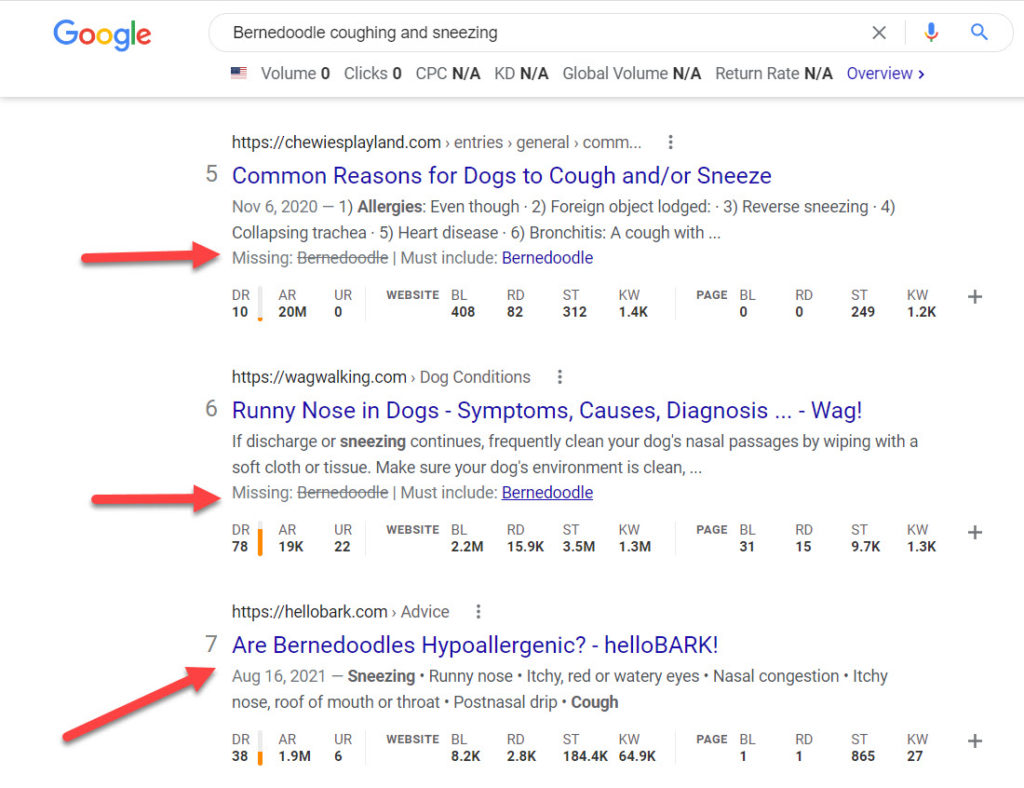
Obviously we can see many of these results aren’t specific to Bernedoodles, and the 7th result here is about whether Bernedoodles are hypoallergenic not what to do when your Bernedoodle is sick.
If we had an expert with some information specific to Bernedoodles that would differentiate it from a general answer about dogs that might be a good topic to target, but if the answer is effectively the same as the answer about dogs in general (and if we’re not confident in the search volume for the term in the first place) this may be one to skip.
Sometimes you see sites that don’t seem to really answer the query very specifically, and other times you see more of a mix of sites in search results because Google is looking for diversity. Let’s look at “Bernedoodle pictures” which has some search volume and a zero keyword difficulty score:
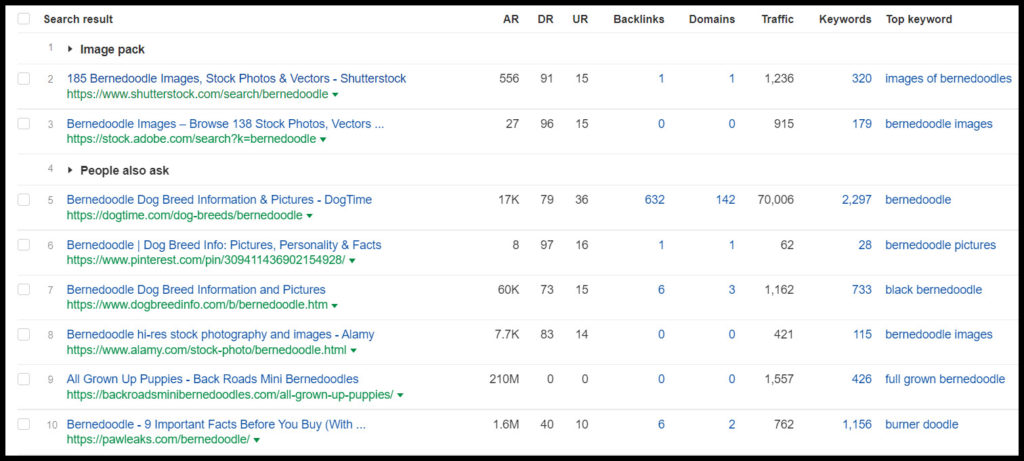
Despite this being a zero difficulty SERP, some things to note:
- The top results are very high authority
- The top results have high quality, proprietary stock photos of Bernedoodles
- The other results sprinkled in are breed overviews from general dog sites with one listing from a Bernedoodle breeder with pictures.
Even though the results in this SERP don’t all target “Bernedoodle pictures” specifically, if you scroll down to the 2nd and third pages you can see that there are actually lots of other pages that do that aren’t ranking. So it’s likely that this is the mix of sites Google thinks will be most useful to searchers for this site.
We also may not be able to put together a great collection of Bernedoodle pictures – and certainly not those that can help us jump over crazy authoritative domains like Pinterest, Shutterstock, etc.
The Final Piece of the SERP Analysis Puzzle: Content Quality
OK so let’s say we finally do find a great query that fits most of the bill for us:
- There’s not a ton of sites answering the question directly
- The sites that are ranking aren’t out of our depth authority-wise
- We have a chance to achieve “topical authority” for this type of query
The last piece of the puzzle is determining whether we can not only create the type of content that’s ranking, but surpass the quality of the content that’s ranking as well.
An important note here: the best content doesn’t always win.
This is important to note, because the trick here is not just to beat the content quality of the top result. Often times that will be ranking because it’s living on an authority domain – the rules for Forbes or Amazon or Business Insider aren’t the same as the rules for you. Stinks, sad, maybe shouldn’t be the case but this is the game you’re playing.
You want to look at things like:
- Word counts for other documents in the SERP
- What topics those documents are covering
- What they’re including in their articles (images, checklists, tools, etc.)
To make sure that you can create an even better answer to the query. That doesn’t even mean you’ll necessarily rank first, but it gets you into the game.
There are a lot of tools that help do this analysis in terms of the length of your content and the topics to cover, including:
And others.
That’s it! Easy, right?
This is a ton of work, and it can very frustrating when you’re working on a new or lower authority site and bumping up against SERP after SERP that you’re just unlikely to be able to rank for.
BUT mastering in-depth SERP analysis really is the only way to truly unearth legitimate opportunities for traffic while also avoiding terms that may seem enticing but that you don’t actually have any real hope of ranking for.
AND because you got this far, here’s Pinecone with “his football” (formerly my son’s) after he raced outside with a table cloth and destroyed it in ~2.7 seconds:

